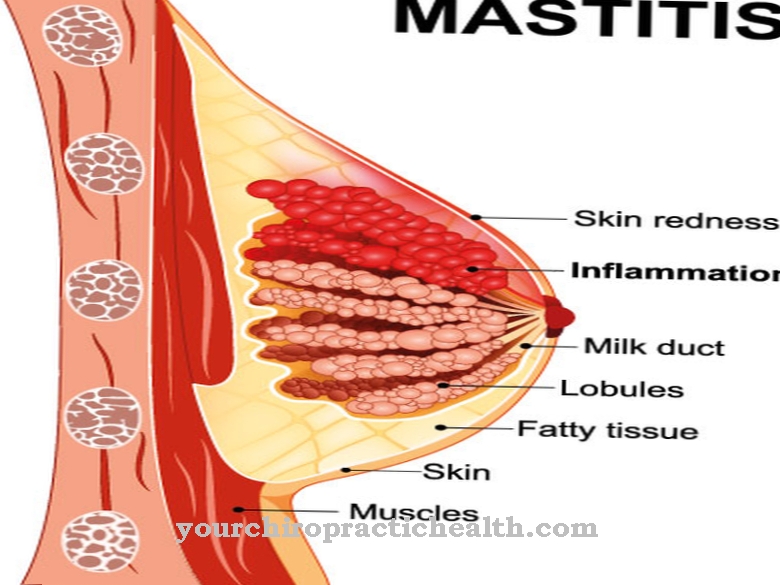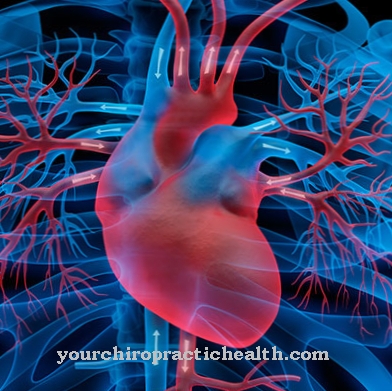At a Viral disease Viruses get into the human body and multiply there. The result are symptoms of the disease that differ depending on the virus.
What is a viral disease?
A Viral disease is the result of a virus infection. Viruses can invade the cells of the body. If they have multiplied there, the body reacts with symptoms of the disease.
Viruses need other organisms to multiply. They use the cells of the respective organism as host cells. It does not multiply outside of the host cell preferred by the respective virus. Viruses take over control of the host cell after successful penetration.
If the body's immune system detects the reprogrammed cells, it causes the affected cells to die. The result is inflammation, which is usually part of the viral disease.
Viral diseases can lead to the death of the affected organism. Viruses, however, benefit from keeping their host alive - otherwise they can no longer multiply. Viruses that are not yet attuned to the human organism as a host pose a great danger. This also applies to viruses that do not affect their host, but are already transferable.
causes
The cause of a viral disease is the successful penetration of viruses into an organism. The infection can take place in different ways:
Droplet infection: Viruses get into the air from already infected people when they talk, cough or sneeze. If the viruses get from there onto the mucous membranes of other people's upper respiratory tract, they will also be infected. Examples are runny nose, measles, and chicken pox.
Contact / smear infection: In contrast to the droplet infection, the viruses are not transmitted via the air, but through the body excretions of infected people or animals. In the case of direct contact infection, the person concerned comes into contact with the infected person.
Viruses can be transmitted indirectly through contaminated objects or food. Examples are polio (polio) and Ebola.
Body fluids: In this case, the viruses are transmitted through direct contact with the mucous membrane or blood. Examples are HIV and hepatitis B and hepatitis C. A sub-category is the transmission through insect bites: Some viruses are passed on by blood-sucking insects, such as the TBE viruses by tick bites.
Symptoms, ailments & signs
A viral disease is usually associated with fairly clear and typical symptoms, so that affected people can recognize a viral infection without a doctor's diagnosis. Probably the most obvious symptom is a general malaise. Affected people feel very tired and their workload is very limited.
In addition, there is often inflammation of the airways, which can lead to a strong and annoying cough. A runny nose, aching limbs, and severe headache are other symptoms that can occur in connection with a viral disease. Anyone who refrains from medical and drug treatment at this point must expect a considerable worsening of the symptoms mentioned above.
Anyone who decides on such a treatment at the first signs of a viral disease will feel a quick and speedy recovery. V The severity of the individual symptoms depends on whether the person concerned decides to see a doctor for treatment. Ideally, individual symptoms can be nipped in the bud with such a treatment so that nothing stands in the way of a full recovery. If you have a viral disease, going to the doctor should definitely not be put off the back burner.
Diagnosis & course
Viruses that cause colds and flu usually lead to a harmless viral disease. The course of the disease begins with a runny nose, cough and fatigue. The affected person sometimes has a fever.
In the case of flu-like infections, the course is usually more protracted and the symptoms more pronounced. If the sick person stresses himself too much, secondary diseases such as pneumonia, heart damage or infections in the ear and sinuses can occur.
Typical childhood diseases such as measles, mumps, rubella or chickenpox usually show a harmless course of the disease. Typical of these viral diseases are rashes that look different depending on the virus and sometimes itch. General malaise and fever also occur. As a precautionary measure, children are vaccinated against some of these viruses, including polio. In some cases there are complications that can lead to permanent organ damage.
The course of the disease in people who are infected with the HIV virus varies greatly. Often people live with it almost unimpaired for years. HIV viruses attack the immune system. The viral disease leads to death in most cases.
Viruses that are not adapted to humans as hosts lead to a particularly serious course of the disease. The death rate from such viral diseases is high. Widespread epidemics and pandemics can occur. Well-known examples are swine flu and Ebola fever.
When should you go to the doctor?
Viruses have the property of being able to spread quickly in the organism within a few hours or days. If they are offered little or no resistance, their general health quickly deteriorates. Only rarely does the body manage on its own to fight a viral disease without support. For this reason, people with a weakened or not yet fully developed immune system should consult a doctor immediately at the first signs of a health problem. If there is a decrease in physical performance, an internal weakness or a diffuse feeling of illness, the organism needs help.
If there is a fever, loss of internal strength, headache, cough or runny nose, a doctor should be consulted. Medical assistance is also advisable in the event of vomiting, diarrhea and loss of appetite. If the day-to-day obligations cannot be fulfilled, if there are further functional disorders or if the person concerned suffers from pain, a doctor's visit is necessary.
Sleep disorders, impaired concentration and attention, as well as impaired mobility must be examined and treated. A visit to a doctor is advisable in case of sweating, cramps and bleeding. If the existing complaints increase in scope and intensity or if further irregularities appear, the help of a doctor should be sought as soon as possible.
Treatment & Therapy
Unlike bacterial infections, doctors do not treat viral diseases with antibiotics. You may prescribe medication to relieve symptoms.
In the case of flu-like infections and colds, bed rest and adequate fluid intake help. Salt water helps with swollen mucous membranes. It can be given in the form of nasal sprays or nasal rinses. Headache tablets can be used, as well as soothing throat tablets. The supply of vitamin C strengthens the general defense.
In the case of childhood diseases, the focus is on relieving itching. The doctor and parents continuously check the general condition in order to rule out complications and secondary diseases as well as possible.
A number of different drugs are available to HIV patients today that can reduce the viral load in the body. The drugs respond differently to each person affected. Continuous medical care is therefore essential.
prevention
Some viral diseases can be prevented by good hygiene. Regular exercise and a healthy, vitamin-rich diet strengthen the immune system. This is how some viruses can be blocked.
Vaccinations are currently only possible against a small proportion of the viruses. These include the childhood diseases polio, measles, mumps, chicken pox and rubella. Other examples are TBE and hepatitis A and B. People infected with HIV can prevent the virus from spreading by engaging in only protected sex.
Follow-up care for viral diseases depends on the particular disease. It can be discussed with the family doctor or specialist. The patient's cooperation is important to speed up regeneration and, if necessary, to avoid relapse or other complications.
Aftercare
A viral disease is often linked to a weakening of the organism. Here it is important to slowly restore the old performance without overwhelming yourself. In this context, it is important to have a good and adequate sleep, as this provides the body with a significant recovery function during aftercare.
A balanced diet is also part of aftercare. Fruit and vegetables can rebuild the immune system through the vitamins they contain and thus strengthen the body's own defense against viruses and bacteria. It is also important to drink enough. 1.5 to 2 liters of drinking amount per day can be covered particularly well with water or herbal teas. If the viral disease has affected the intestine or stomach, bland foods are often also helpful in follow-up care. Alcohol, nicotine and drugs should of course be taboo.
A trained body is often more resistant to infections. The body can be hardened through dosed physical activity, but also hardening in the sauna or treading water after Kneipp. However, excessive demands must be avoided in the follow-up care after viral diseases.
You can do that yourself
In the case of viral diseases, a medical examination is necessary. Medication may be prescribed to relieve the symptoms. The most important measure is bed rest. In addition, sufficient fluids must be consumed. The diet consists of light foods such as rusks, chicken broth or grated apples. In the case of swollen mucous membranes, inhaling salt water is recommended. Nasal sprays or rinses are also suitable. In addition, good personal hygiene is important. Regular hand washing prevents other people from being infected. Sick children should be carefully observed.
If the state of health worsens, medical advice is required. Particularly in the case of serious illnesses such as polio or mumps, close observation and, at best, close medical supervision are important to ensure the child's health. In the case of notifiable viral diseases such as diphtheria or acute viral hepatitis, the responsible authorities must be informed.
Contact with other people should be restricted until the disease has resolved. What measures can be taken in the event of a viral disease depends on the type of disease. The doctor in charge can suggest suitable measures and, if necessary, consult a nutritionist and various specialists.

.jpg)






















.jpg)



